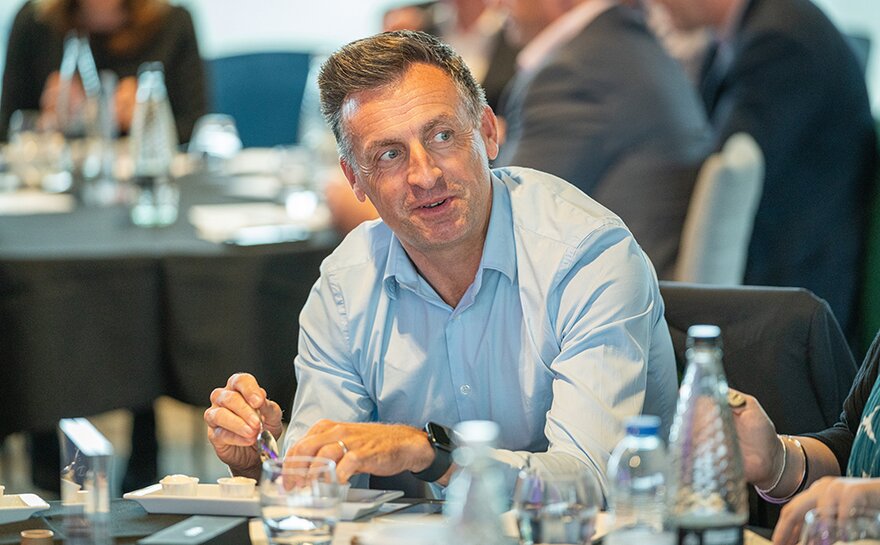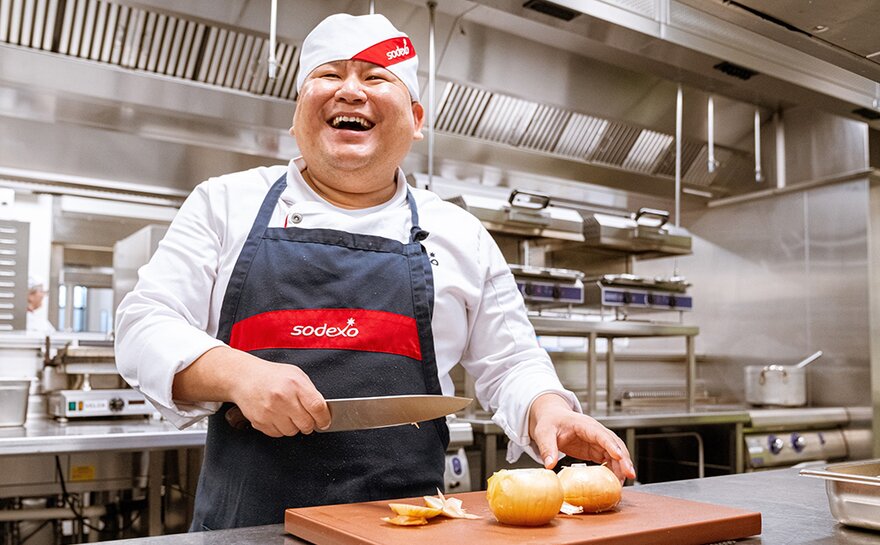Sodexo has been feeding one-third of the British Army for 17 years, working to bend military attitudes to a more modern offering. Emma Lake finds out how the caterer serves those who serve
When the Ministry of Defence launched an £8b project to make its soldiers' lives better across garrisons in Aldershot and across the Salisbury Plain, Sodexo came on board to deliver a culinary offer that supported both physical fitness and mental health.
For the past 17 years the catering giant has been responsible for feeding more than one-third of the British Army, and in September its contract was renewed for a further 17 years in a deal worth £730m over its initial 10-year term.
Paul Anstey, chief executive of Government for Sodexo, says: "We aspire to serve those who serve, and this is the top end of that scale. It's a 35-year journey and we're halfway through. To get a contract extension means a lot to the team, and the background to that is a business that serves 25,000 personnel every day. It's a big operation."
Project Allenby/Connaught is being delivered by Aspire Defence Services (ADS) to provide modern purpose-built accommodation that will improve the living conditions of soldiers who had previously been housed in outdated buildings with communal facilities that were dilapidated and costly to maintain.
Across the garrisons Sodexo delivers catering, retail, mess management and cleaning services. Its food offering is delivered across some 40 outlets, which mark a dramatic evolution from the dated image of military catering as trays of bland food served in characterless refectories. It also runs 15 Costcutter shops, theatres and other social spaces as well as delivering hospitality for meetings and showcases and facilities management, including cleaning of 10,500 houses a week.
Researching modern food for service personnel
When Sodexo came on board it undertook research with Ipsos MORI and King's College London to determine what a modern food offer for service personnel should look like. It found a symmetry between junior ranks and university students in a desire for a flexible high-street style offer, encompassing digital solutions and grab-and-go options.
The caterer took its findings to ADS and command and set about delivering just that, using the experience of its wider teams across education and business and industry.
Anstey says: "For us this has always been about delivering an improved lived experience. That's a term used a lot in defence, but when it came to articulating what it meant they struggled, and I'm particularly proud that through our work with Ipsos MORI and King's College London we've filled that gap.
"When speaking to senior commanders, their frame of reference is what they've grown up with, in junior ranks and throughout their career, which is entirely understandable. What we've done with this research is say, well, hang on, when we compare servicepeople to undergraduates and consumers on the high street, their wants and needs are not that different. By sharing that data, you can start to effect change in the establishment.
"Looking at creating social spaces was a key way of changing outlets that were traditionally almost refectories to something that was more appealing for people to have meetings in, to work in and grab a coffee, and also to have lunch and dinner should they choose to. They want the high street to be brought within the wire rather than having something different to what they see when they go into Salisbury or Winchester.
"Having this data enabled us to invest jointly with Aspire and the Ministry of Defence and to create things that were innovative in that marketplace and we continue to do that. Ultimately, we're a partner with them to grow and retain the junior ranks into future officers."
There were two anchors to Sodexo's work: the food offering itself and the creation of social spaces that would build communities, something that was particularly important when the Army Basing Programme saw some 4,000 troops relocated to Allenby and Connaught from Germany between 2016 and 2020.
Anstey explains: "The army, in partnership with us and through Aspire, were keen to create a different environment so they had a soft landing. Infrastructure grew dramatically in terms of increasing food outlets and bringing together messes that had previously been fragmented. We went over to Germany and interacted with families and servicemen and women to give them the comfort that they were coming back to something special and different.
"It's a huge amount of new accommodation – you're essentially creating a new town with schools, medical facilities, etc. They want to encourage the community to stay there and not to fracture as that's good for morale, so our role is to support that lived experience.
"We're often seen in old-fashioned terms as just the caterer, but our role has become broader than that over time to support infrastructure servicepeople and their extended families."
Nutrition to support mental health
The importance of nutrition and the promotion of social spaces that support good mental health have been central pillars in developing Sodexo's offering across the garrisons, and Anstey explains that the offer needs to encourage a sense of community.
He says: "We want to encourage people to talk and eat and meet together. We want those connections, it's good for morale and it's the tradition of the army, so our outlets are driven to do that. What we don't want is people to go back to their rooms and feel isolated. There's a broader eco-system and as a long-term partner to the military, we should be helping them retain people for longer."
To support this aim in 2022, Sodexo launched the Mindful Active app, an educational tool that provides holistic health and wellbeing guidance. Built on four pillars – fuel, focus, perform and restore – it provides nutritional information, wellbeing signposting, recipes and cooking advice.
The app allows messages, tips and guidance to be accessed on the go, empowering users to make informed choices about their diet. Holistic mental health guidance is also available, with everything from simple tips through to links to professional advice and services.
Anstey says: "We looked across the sector and at what we do and the Mindful Active solution was the perfect one. There's a focus on what food is best to fuel servicemen and women and what interventions give them a better success rate. We naturally want to enhance their performance when they're out on battlefield training and we want to have interventions to restore them afterwards. If they've gone through a heavy day, we look at what we can do to restore their health so they're ready to go through the cycle again.
"The old world was about high carbohydrate choices and stocking up on the wrong types of food – like pie and chips – just to fuel people, but the research and work we did with Mindful Active showed you can have high-protein solutions that are not high in saturated fats and carbohydrates. Then it's about how to educate people to think differently about their diet. Bringing these learnings in has been key.
"It's been similar around the tradition of formal eating times – rather than having three big, bulky meals a day, it can be better to have flexibility. It sounds very simple, but it's been a generational change in the military."
Sodexo's teams speak to new recruits to explain how they can best fuel themselves through the training period. The almost 1,500 people it employs at the barracks – many of who are veterans or the relatives of servicepeople – also act as an early warning system if recruits appear to be struggling.
Anstey adds: "The role of trusted colleagues they see every day is really important. If you have Mary behind the till in an outlet, day in, day out, she will get to know recruits and see the signals, so it's no different to universities with undergraduates. Equally, if our team haven't seen people for a while, it's a red flag to let command know. The same issues of mental health and suicide affect the military as the outside world."
The changes Sodexo has brought about alongside the Ministry of Defence and ADS are being well-received across the bases, with net promoter scores having recorded a 25% boost, but Anstey is clear that work needs to continue: "The challenge in defence around recruitment and retention will remain, and it will probably get a little bit harder before it gets better. We will continue to challenge ourselves, our clients and consumers.
"The way the army houses and feeds recruits will evolve as the high street evolves again with more digital solutions, more mobile offerings and the additional influence of artificial intelligence. For us that's that next evolution, and in two or three years' time we will have to refresh that research and then educate our clients again."
Feeding the troops after the death of Queen Elizabeth II
When troops mobilise so does the caterer, and the past 18 months have seen large-scale operations including the death of Queen Elizabeth II and the coronation of King Charles III.
The caterer's role in operations London Bridge and Golden Orb saw it receive a personal letter of thanks from King Charles III and the Extra Mile Award at the Foodservice Cateys last week (see page 91).
Both events required the rapid mobilisation of people across various government departments, as well as the Church of England, the Metropolitan Police Service, the British Armed Forces, the media, the Greater London Authority and Transport for London, all of who needed to be fed.
Anstey says: "The plans for both the sad death of the Queen and the Coronation were in place effectively to be pulled off a shelf, but the delivery does rely on the quality of individuals and I'm very proud of those people in our teams who were able to react very quickly."
While operation London Bridge had been meticulously planned for, the death of the Queen at the Balmoral estate in Scotland complicated its execution. For Sodexo this meant calling on teams in Scotland and establishing temporary bases for the Scottish government.
Anstey adds: "We're very fortunate with our footprint in the UK in that we can move resources to cope with changing situations. Although it's stressful on occasions, the team get a huge amount of learning and enjoyment from it because they're often put into situations that are once in a lifetime."
Sodexo's teams ensured that thousands of vital personnel were fuelled to focus fulfilling their roles during these significant historical moments. At RAF Halton alone, Sodexo ramped up its offering to serve almost 30,000 additional meals and 600 packed meals to cater for the additional military taking part in the Coronation. Teams arrived on-site at 2am to prepare a 4am breakfast service and to supply retail shops for snacks and drinks within extended hours.
Continue reading
You need to be a premium member to view this. Subscribe from just 99p per week.
Already subscribed? Log In






